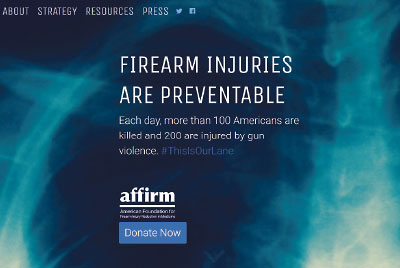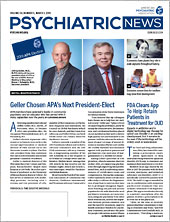APA has joined a physician-led foundation that is working to reverse the epidemic of gun violence in the United States by raising funds for prevention research and innovation. Its name is the American Foundation for Firearm Injury Prevention in Medicine (AFFIRM).
Nearly 39,000 people were killed by firearms in 2016, and nearly two-thirds of those deaths were suicides, according to government data. When adjusted by population size, this amounts to the highest rate of firearm deaths in the past 50 years.
“APA believes that robust study into the underlying causes of gun violence and the effectiveness of potential interventions is necessary to reversing course and preventing further injury, death, and other harms to society resulting from firearms,” said APA CEO and Medical Director Saul Levin, M.D., M.P.A., in a blog posted on APA’s website. “As physicians and experts in the mind, body, and brain, psychiatrists have a vital role to play in advocating for change based on quality research on this issue.”
APA’s Board of Trustees voted at its December 2018 meeting to work with AFFIRM, joining a number of other organizations including, among others, the AMA, American College of Physicians, American Academy of Pediatrics, American College of Emergency Physicians, and American College of Surgeons.
An APA public opinion poll last year found that most Americans (87 percent) see gun violence as a public health threat, including 77 percent of Republicans and 96 percent of Democrats. “APA has and will continue to call for Congress to take sensible evidence-based action to prevent future deaths with dedicated federal funding for research,” Levin said.
The Centers for Disease Control and Prevention (CDC) had been hampered from studying gun violence prevention due to a provision attached to a 1996 Congressional spending bill barring research that might “advocate or promote gun control.” Known as the Dickey amendment, after its chief sponsor Republican Jay Dickey, the measure was advanced by the National Rifle Association and stripped away $2.6 million of funding for CDC gun research.
The Dickey amendment didn’t explicitly ban research on gun violence, but it has had a chilling effect on such activities at the CDC and other federal agencies and even in the private sector. For example, the CDC’s spending on firearm injury research fell 96 percent by 2012, and the number of academic publications about firearm injury research dropped by two-thirds after the Dickey amendment was passed, according to various studies published in JAMA.
Democrats considered it a win when the $1.3 trillion government spending package that passed last March spelled out that the CDC “has the authority to conduct research on the causes of gun violence.” However, the 2018 spending package did not earmark any funding for such research.
Motor vehicle accidents claimed about as many lives as did gun violence in the United States in 2017: both killed more than 37,000 individuals. But the federal government, by contrast, has invested billions of dollars on motor vehicle crash research, leading to a wealth of effective interventions such as child safety seats, seat belts, air bags, motorcycle helmets, better roadway design, and a minimum drinking age. As a result, the number of motor vehicle deaths has been cut in half, dropping from 26 deaths per 100,000 people in 1970 to 11 deaths per 100,000 in 2017.
“Physicians and other health care professionals are in a unique position to help with firearm injury prevention, but they lack the research-backed education, tools, and resources to do that,” according to AFFIRM’s website. Less than 20 percent of suicidal patients who presented to the emergency room were asked about their access to firearms and other lethal means, according to one study published last year in Psychiatry Residency. Some 85 percent of suicidal patients discharged to home had no documentation of an assessment of lethal means noted in their charts, according to that study.
AFFIRM takes no position on an individual’s right to gun ownership and eschews a policy agenda. According to its website, its goals include the following:
•
Raising research funds from the private sector.
•
Providing funds to qualified researchers through their academic and/or professional medical organizations using an open and competitive process.
•
Identifying and scoring health and research priorities.
•
Developing best practices recommendations and related evidence-based training and educational resources.
•
Integrating research evidence into medical education and health practices. ■
Levin’s blog can be accessed
here. AFFIRM’s website is
https://affirmresearch.org. “Frequency of Lethal Means Assessment Among Emergency Department Patients With a Positive Suicide Risk Screen” is available
here.

